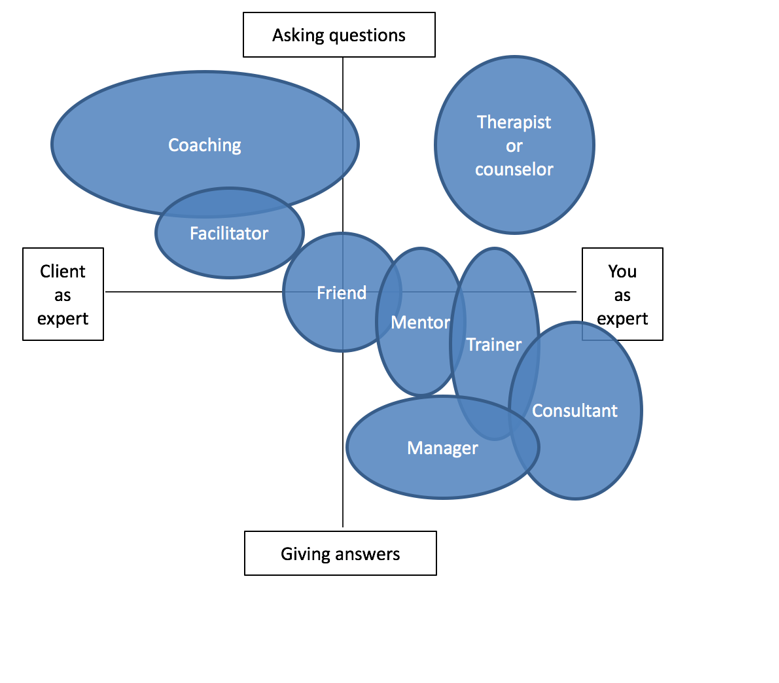
One of the most helpful ways to understand coaching more clearly is by distinguishing what coaching is from what coaching is not. Coaching is not mentoring, counseling, consulting or just being a friend. Coaching is not telling people what to do. Coaching is not being someone else’s expert.
One of the best ways I’ve found to communicate these distinctions comes from a simple coaching book I picked up over 10 years ago. Amazon tells me it was March 12, 2005 to be exact. The book, Getting Started in Personal and Executive Coaching is a decent book for understanding how to go about establishing yourself as a coach. Early in the book, somewhere around page 30 if memory serves me, the authors offer a simple graphic for describing the relationship of coaching other fields. I’ve used a variation of that graphic for many years when I teach coaching. Here’s my version of the graphic:

As you can see, the graphic offers two axes: 1) from giving answers to asking questions, and 2) from you as the expert to the client as the expert. Coaches help by asking questions much more than by giving answers (which they very rarely, if ever, do). And coaches treat the client as the expert most of the time. As you can see, coaching extends a bit into the coach as the expert, but this “crossing of the line” is mostly about the coach being an expert at coaching more so than a content expert (that is, an expert in the client’s agenda).
I find this graphic helpful because it reminds us that value can be offered in many different ways, of which coaching is just one.
One thing I really like about this graphic is how it demonstrates a number of helping relationships clustered in the lower right quadrant where the helper is the expert and they help mostly by giving answers. While a mentor, trainer, manager and consultant each operate in different ways, what they share in common is some level of expertise and an approach that helps by mostly giving answers.
Another thing I like about the graphic is the way it depicts the close relationship between coaching and facilitation. These fields are cousins, if not siblings. Facilitators make things easier, and that’s essentially what a coach does, albeit in different ways and in different contexts when compared to facilitators.
The graphic doesn’t describe every distinction. For instance, one of the most helpful distinctions between coaching and counseling is that coaches focus primarily on the present into the future while counselors tend to pay attention to a client’s past up to the present. And of course, the outcome that’s expected from different fields is not represented. One would see a counselor in hopes of finding healing and understanding; a mentor would be engaged in hopes of getting advice; you’d seek out a manager to get direction or support.
Let me also make one more observation. When I’m training new coaches, the non-coaching field they most want to inhabit is that of consultant. This is surprising because coaching and consulting are on pretty much opposite ends of both spectra. Consultants do ask questions, but they do so in order to gather enough information so they can understand the client’s situation and then offer a solution based on their expertise (btw, a solution is a complex arrangement of answers). It’s important to note that typical consultants do not ask questions in order to tap into the client’s expertise the way coaches do.
What about you? What do you find helpful about this graphic? And what other ways have you found helpful for describing the distinctions between coaching and other fields?



1 thought on “A Helpful Graphic for Describing What Coaching Is (Not)”
Hi Chad! thank you for sharing about what coaching is NOT. It continues to amaze me how we are conditioned early on to function in the “You as Expert” and “Giving Answers.” Just the other day I had a relative sharing about a discussion they will need to have with their pastor. They were a little concerned about how that meeting would go, so I immediately without even thinking went into advice giving mode about me going through a similar situation and the outcome of it all. Instead, I should have asked them, “what concerns you the most about having this discussion with your pastor?” It is always important to remind ourselves from the get go, that the client is not only the expert here, but they have already played out that meeting in their mind many times. Even though they appreciated me sharing from my own experience, I didn’t even realize how I had hijacked the conversation until later that day. In the words of Yoda, “Still being developed as a coach I am.” Thanks for the reminder Chad and for clarifying for us once again what Coaching is NOT. The diagram is a helpful visual resource. Good stuff!
Thanks CAM!